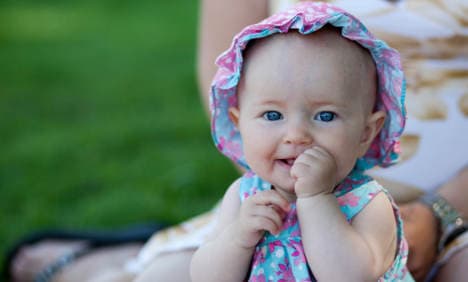Having kids later makes for a happy family

Children are a blessing? Only for parents over a certain age, and then only up to a certain number, a study published by a German research institute shows.
The study is good news for all those who decide to put off having children until later in life.
If you wait until you are 34 you are much more likely to respond positively to the birth of your first child and then to remain happy throughout the child's upbringing, the research conducted by the Max Planck Institute in Rostock suggests.
The researchers came to their conclusions after looking into the well being of 7,000 parents.
But for those who make the plunge into real adulthood between the ages of 18 and 22 the story is quite different.
The researchers in Rostock observed levels of happiness among this age group dropping before the birth of their child.
Even after the child was born and grew up the happiness of the parents did not rise above the baseline, the researchers found.
This same effect was noticed in in parents who had their first child between the ages of 23 and 34, although it was not as extreme.
Third time lucky?
Max Planck Institute researchers, who conducted the study in cooperation with the University of Western Ontario in Canada, also found that the number of children has a strong impact on parents' happiness.
In bad news for all those third children among us, the findings show that if you want to be happy you are best stopping at two.
While the arrival of the first and second child gives parents a discernible boost, the third makes no positive impact on the parents' wellbeing.
The opposite may in fact be true. The Rostock scientists noted a slight negative impact on happiness levels with the arrival of a third child, although they were quick to point out the difference was not statistically significant.
The results of the study correspond in a "amazingly exact way" to the changing life choices that have taken place in the industrialized world over recent decades, they argue.
The trend towards having children in one's mid-thirties and the reduction in the number of three, four or five child families has long been attributed to changes in societal values or to the incompatibility of career and family.
But the German researchers now have another explanation.
"Whoever observes happiness increasing among those who start families later in life, when they have greater financial and social security, and also that people are happiest with no more than two children, is likely to make similar life choices," the researchers argue.
Comments
See Also
The study is good news for all those who decide to put off having children until later in life.
If you wait until you are 34 you are much more likely to respond positively to the birth of your first child and then to remain happy throughout the child's upbringing, the research conducted by the Max Planck Institute in Rostock suggests.
The researchers came to their conclusions after looking into the well being of 7,000 parents.
But for those who make the plunge into real adulthood between the ages of 18 and 22 the story is quite different.
The researchers in Rostock observed levels of happiness among this age group dropping before the birth of their child.
Even after the child was born and grew up the happiness of the parents did not rise above the baseline, the researchers found.
This same effect was noticed in in parents who had their first child between the ages of 23 and 34, although it was not as extreme.
Third time lucky?
Max Planck Institute researchers, who conducted the study in cooperation with the University of Western Ontario in Canada, also found that the number of children has a strong impact on parents' happiness.
In bad news for all those third children among us, the findings show that if you want to be happy you are best stopping at two.
While the arrival of the first and second child gives parents a discernible boost, the third makes no positive impact on the parents' wellbeing.
The opposite may in fact be true. The Rostock scientists noted a slight negative impact on happiness levels with the arrival of a third child, although they were quick to point out the difference was not statistically significant.
The results of the study correspond in a "amazingly exact way" to the changing life choices that have taken place in the industrialized world over recent decades, they argue.
The trend towards having children in one's mid-thirties and the reduction in the number of three, four or five child families has long been attributed to changes in societal values or to the incompatibility of career and family.
But the German researchers now have another explanation.
"Whoever observes happiness increasing among those who start families later in life, when they have greater financial and social security, and also that people are happiest with no more than two children, is likely to make similar life choices," the researchers argue.
Join the conversation in our comments section below. Share your own views and experience and if you have a question or suggestion for our journalists then email us at [email protected].
Please keep comments civil, constructive and on topic – and make sure to read our terms of use before getting involved.
Please log in here to leave a comment.